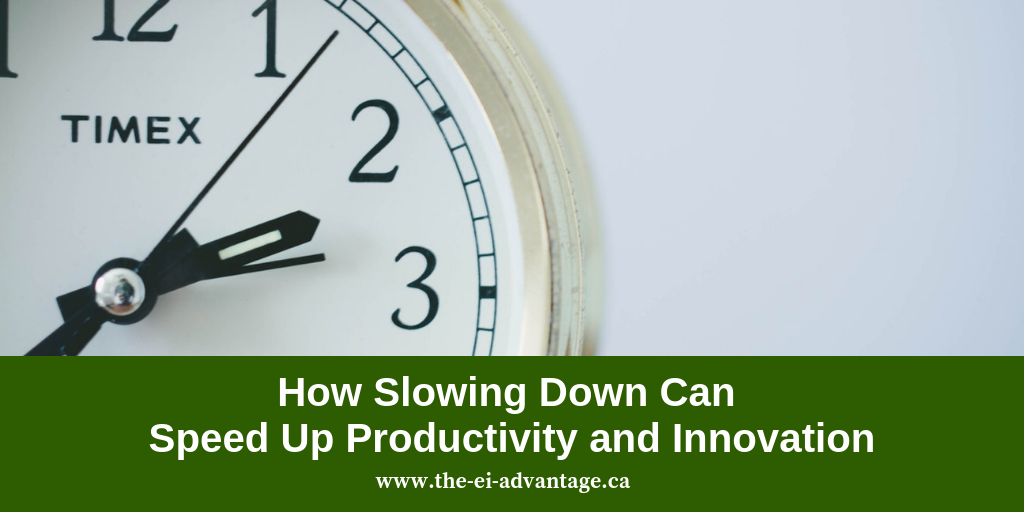Blog
How Slowing Down Can Speed Up Productivity and Innovation
December 06, 2018

When was the last time you took a couple of deep breaths while at your desk? Or when you shut all your browser tabs so you could focus on a single project?
If you’re like most people working in business today then there’s a high likelihood that you may not be able to remember the last time you stepped back from your to-dos and took a moment to recenter yourself and focus.
If this sounds familiar, don’t worry: we live in a fast-paced time when the idea of “slowing down” feels counter-intuitive, maybe almost a little alarming, to most people. However, with the U.S. Bureau of Labor Statistics reporting that productivity has dropped by 3% annually since 2015, whatever we’re doing isn’t working, and is on the decline.
Not only does forcing yourself to work tirelessly impact your professional output, but it can have serious health consequences as well: findings in the British journal The Lancet found that those who work more than 55 hours a week at higher risk for a stroke, coronary heart disease, diabetes, and depression.
Here’s why slowing your pace not only helps you work smarter, but actually helps you be more productive than before:
You’ll Have More Time
Here’s a secret: being “busy” is a state of mind. Of course, you may actually have more on your plate than you can handle, but how you handle your workload (and what you accomplish) may be contributing more to those stressful feelings than you realize.
We love this excerpt from Carl Honoré’s book “In Praise of Slowness” where he discusses how thinking more slowly impacts our cognitive state:
“Slow Thinking is intuitive, woolly, and creative. It is what we do when the pressure is off, and there is time to let ideas simmer on the back burner. It yields rich, nuanced insights and sometimes surprising breakthroughs.”
So if you’ve ever felt that frenzied state of over-worked anxiety, remember these words about “soft thinking” and make a point to focus on flowing down your thought process. You’ll find that you can focus more easily and solve problems much more quickly by slowing down to solve them.
You Can Think More Rationally
There are two kinds of thinking: fast and automatic, and slow and logical.
The first is closely tied to our evolutionary fight-or-flight responses, which is what makes it problematic when it comes to problem-solving: if we’re in an agitated state we will naturally overlook small details while trying to quickly solve the problem.
Slow and logical thinking, on the other hand, is more tied to our “parasympathetic” nervous system, which helped us evolve to handle rational thoughts and problem-solve.
When we force ourselves to think more slowly we take our brains out of “mental autopilot” and focus on logical solutions instead of emotional and knee-jerk ones. This doesn’t mean that we should ignore our intuitions, but rather that slowing down gives us the time to process those intuitions and arrive at logical conclusions.
You Become a Better Listener
Do you remember the last time you waited for the other person to finish speaking before you started talking?
Most of us spend conversations listening for an opportunity to speak instead of practicing active listening. Unfortunately, when we spend conversations listening for opportunities to speak we’re more likely to talk at, over, and past other people, rather than having a conversation with someone.
Not only doesn’t communicating more slowly make people more interested in what you have to say. Slowing down also gives you time to really listen and process new ideas and information, leading to fewer miscommunications and more efficient conversations, increasing productivity and output for everyone involved.
By taking the time to move more slowly you can eliminate minor mistakes, take the time to focus on your work, and work more collaboratively with others. At EI Advantage, we help leaders and team members develop their Emotional Intelligence (EI) to better understand how to create workspaces that encourage success and develop top-tier leadership.
Want to learn more about how our services can help you improve your team’s overall performance? Contact us today or reach out on Facebook, LinkedIn, or Twitter.
